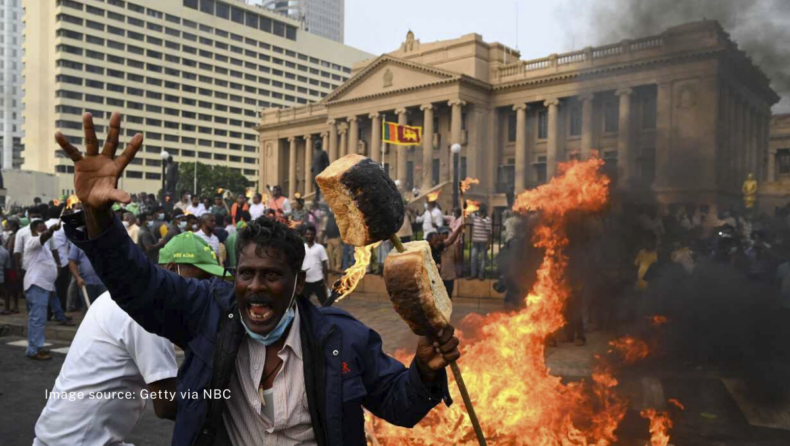Government enforces a nationwide lockdown amid protests and food shortages.
Highlights:
- Sri Lanka declared a state of emergency on May 7th as the economic and financial crisis deepened.
- Prime Minister Rajapaksa announced his resignation Monday afternoon after clinging to power for 2 weeks.
- Government supporters attack peaceful protesters in Colombo, triggering violent clashes in the nation’s capital.

Colombo: Just a few hours after the Rajapaksa ancestral home set ablaze in Hambantota, President Mahinda Rajapaksa, announced his resignation. The country has been in a deep economic crisis since late February. Food, petrol and forex shortages brought life on the island to a standstill. The national capital of Colombo is under a strict curfew after clashes between pro-government and anti-government protesters.
UNI reports that 7 people, including a police officer, were killed and 220 others were injured in the conflict.
Witnesses described to Human Rights Watch that the pro-government agitators arrived in busses with “knives and sticks”. They allegedly headed directly for the makeshift essential facilities as if “they knew what to look for”.

In a strange turn of events, Amarakeerthi Athukorala, an MP, opened fire on protesters. Police report that the Athukorala had killed one and injured another before taking his own life.
Corruption, Crisis and the Silk Road:
The crisis is attributed to mismanagement of the economy under the post-war Mahinda Rajapaksa administration. Massive financial borrowing from China for low-return infrastructure projects put the country in a debt trap. This caused forex reserves to hit record lows in early 2022. China’s interest in Sri Lanka stems from its Silk Road project which includes a maritime trade route to promote Chinese shipping routes.
Meet the Rajapaksas:

Hailing from the southern rural town of Hambantota, the Rajapaksa family saw an astronomical rise into power in the 70s. Buddhist-Sinhala nationalist ideologues, the Rajapaksa brothers (Mahinda, Gotabaya, Basil and Chamal) ruled with an iron fist over the Tamil and Muslim minorities. The family instated themselves in powerful positions and offered large infrastructure contracts to their close circles, pocketing the profits.
Mahinda Rajapaksa oversaw a brutal civil war between the army and the LTTE (Liberation Tigers of Tamil Eelam), a guerilla group fighting for an independent Tamil state. The Tamil genocide cause approximately 120,000 deaths during the final stage of the war. The death toll is unclear as 3 subsequent governments failed to establish investigations as well. All four brothers played crucial roles in Sri Lankan government during the civil war. Current Prime Minister Gotabaya Rajapaksa served as Defense Secretary in the final stages of the war.
International sources confirmed that the army committed war crimes by killing refugees as well as repeatedly bombing no-fire zones.
The World’s Emptiest Airport:
The airport was commissioned by then PM Mahinda Rajapaksa to make his rural home town of Hambantota a metropolis.
In 2016, Forbes named the Mattala Rajapaksa airport “The World’s Emptiest Airport” after its lack of demand for flights. In fact, by Mid 2015, the airport only served 2 airlines, therefore inviting bids for a resale a mere 3 years into operations. Reports suggest that even at its peak footfall, the airport built to serve a million passengers, only saw 21,000.
This airport became unprofitable was unable to generate revenue to pay back the $190 Million borrowed from China’s Exim bank. With the airport running an average of 7 passengers per flight, it became a sinkhole for money in maintenance alone.
In 2020, the airport temporarily decommissioned from commercial use to facilitate cargo flights in light of the COVID-19 pandemic.
The Hambantota Deep Sea Port megaproject also struggled to pay back the millions borrowed for construction and development. China Merchants Port Holdings Company Limited (CM Port) took over the port for a 99-year lease for $1.12 billion.














